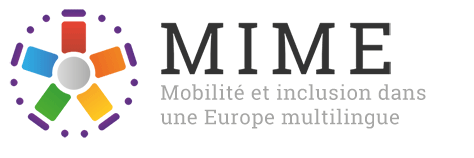
This is the printer friendly version of the MIME expertise page.
http://www.mime-project.org/expertise/
Communication by means of a lingua franca
Our expertise includes both ethnic languages (e.g. English, the language most widely used in this capacity today) and planned languages (e.g. Esperanto).
Universität Leipzig
Language Policy and Social Justice
Our expertise concerns the application of theories of social justice to matters of language policy and planning as well as philosophical issues related to the understanding and assessment of linguistic advantages and disadvantages.
University of Limerick
Language Orientation and metalinguistic awareness
The Special Chair in Interlinguistics and Esperanto settled in the Amsterdam Center for Language and Communication (ACLC) has expertise in language laboratories in Montessori primary and middle schools where pupils learn to invent a secret language to foster group identity
and/or learn Esperanto, the planned language which succeed to form a community of practice, in order to open their perspective on international
communication. Both laboratories help pupils in orienteering in the language panorama in Europe and beyond, through active practices.
The bilingual repertoire, if any, learnt at home, is used in class in a creative and playful way, so that pupils can share linguistic information normally not used in the classroom and increase their metalinguistic awareness.
and/or learn Esperanto, the planned language which succeed to form a community of practice, in order to open their perspective on international
communication. Both laboratories help pupils in orienteering in the language panorama in Europe and beyond, through active practices.
The bilingual repertoire, if any, learnt at home, is used in class in a creative and playful way, so that pupils can share linguistic information normally not used in the classroom and increase their metalinguistic awareness.
Universiteit van Amsterdam
Language rights, language policy and minority rights
The members of the MIME team at the Institute for Minority Studies of the Hungarian Academy of Sciences work on the interpretation, development and implementation of international instruments on minority languages rights. Research interest and expertise include language rights, international protection of minority rights, inter-ethnic relations and inter-state co-operation relevant to minorities.
Magyar Tudományos Akadémia
Multilingualism in Education and Society
Based at University of Milano-Bicocca, the ‘Centre d’Études Linguistiques pour l’Europe’ (CELE) has achieved a long experience in conducting research on multilingualism in the society and at school. Through large quantitative and qualitative surveys it keeps on investigating sociolinguistics and educational aspects of multilingualism both in autochthonous and migration settings, appointed by public and private institutions. The CELE offers consulting and solutions in the field of education to multilingual awareness and its impact on society, families, schools and pupils.
Università di Milano-Bicocca
Receptive multilingual skills
Based at the University of Reims Champagne-Ardenne, the research programme European InterComprehension studies receptive skills in mutually intelligible languages and non-cognate but neighbouring languages (in a European context), how training can improve such skills and how they can be used in interaction.
Université de Reims Champagne-Ardenne
Geographies of linguistic diversity – old and new
Participating in the Centre for Urban Studies (CUS) and the Amsterdam Centre for European Studies (ACES) the political geography team at the Amsterdam Institute for Social Science Research (AISSR) of the University of Amsterdam offers expertise on linguistic diversity from a geographical perspective. We focus on how linguistic ideologies and language policies, geographical imaginations of mobility and embeddedness, bordering processes and geopolitical representations affect territorial identifications in multilingual settings. We analyze the relations between languages and territories, between sense of belonging and sense of place, at multiple scale levels: from cities and their (segregated) neighbourhoods, through (cross-border) regions and nations, to the EU and beyond in its so-called Neighbourhood.
University of Amsterdam – Political Geography (AISSR)
Language economics
The members of the research group “Economics and Language“ (REAL) develop and apply the economics approach and policy-analysis methods to language-related issues. Research interests include language dynamics, language policy evaluation, economics of language, and language rights.
Humboldt-Universität zu Berlin
Language surveys, linguistic diversity
The BRIO-team of the Political Science Department of the Vrije Universiteit Brussel (VUB), a research centre focussing on language issues in Brussels, is concentrating on the following research axes: language policy and integration, managing diversity in society, politics and administration, and comparative research on divided and multilingual cities.
Vrije Universiteit Brussel
Multilevel governance and language policy, auto-centred multilingualism
The working group on language politics based at the University of Augsburg focuses on the governance of linguistic diversity in complex contexts, which are characterised by the overlapping and intersecting of endogenous and exogenous patterns of multilingualism. Under the direction of Prof. Peter A. Kraus, the group has conducted research on multilingual European cities, assessing how auto-centred multilingualism contributes to sustainable diversity policies.
Universität Augsburg
Moral foundations of language policy
The wrong of linguistic domination, the ethics of linguistic standardization, the moral importance equal language recognition, the foundations of linguistic territoriality and linguistic personality, the democratic nature of multilingual states, the nature of linguistic justice.
KU Leuven
Selection, evaluation and design in language policy and planning (LPP)
The team of the "Observatoire Économie-Langues-Formation" (ÉLF) at the University of Geneva brings together researchers with considerable experience in the selection, design and evaluation of language policies. ÉLF Director Prof. Dr. François Grin was Coordinator of MIME and First deputy coordinator of the DYLAN project. He has steered numerous projects for research agencies and provided expertise for international organisations (EU, CoE, World Bank Institute, Organisation Internationale de la Francophonie) as well as national governments or local authorities (e.g. in CH, F, IRL, CDN, NZ, AUS). He is the author of over 250 scientific contributions and is Editor-in-Chief of the journal Language Problems and Language Planning. The ÉLF team offers expertise combining qualitative and quantitative methods
Université de Genève
